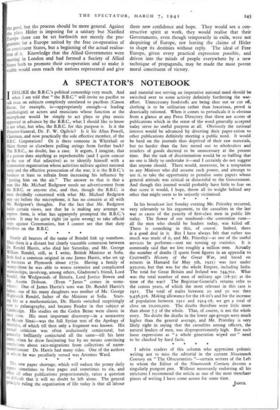A SPECTATOR'S NOTEBOOK
DISLIKE the B.B.C.'s political censorship very much. And 1 when I am told that "the B.B.C." will invite no pacifist to talk even on subjects completely unrelated to pacifism (Canon Raven, for example, is—appropriately enough—a leading ornithologist) or actors and musicians whose function at the microphone would be simply to act plays or play music approved in advance by the B.B.C., what I should like to know is not what, but who, the B.B.C. for this purpose is. Is it the - Director-General, Dr. F. W. Ogilvie? Is it Sir Allan Powell, Chairman, and now practically the sole effective member, of the B.B.C. Corporation? Or is there someone in Whitehall or Malet Street or elsewhere pulling strings from further back? The B.B.C., no doubt, has a case. It argues, I imagine, that if a person does anything as reprehensible (and I quite concur in the use of that adjective) as to identify himself with a Communist organisation whose activities militate against national unity and the effective prosecution of the war, it is the B.B.C.'s business at least to refrain from increasing his influence by putting him on the air." The answer to that is that a man like Mr. Michael Redgrave needs no advertisement from the B.B.C. or anyone else, and that, though the B.B.C. is most decidedly concerned with what Mr. Michael Redgrave may say before the microphone, it has no concern at all with Mr. Redgrave's thoughts. For the fact that Mr. Redgrave holds certain views, not that he is making any attempt to express them, is what has apparently prompted the B.B.C.'s action. It may be quite right (or quite wrong) to take official steps against Communists, but I cannot see that that duty devolves on the B.B.C.
* * * *






























 Previous page
Previous page